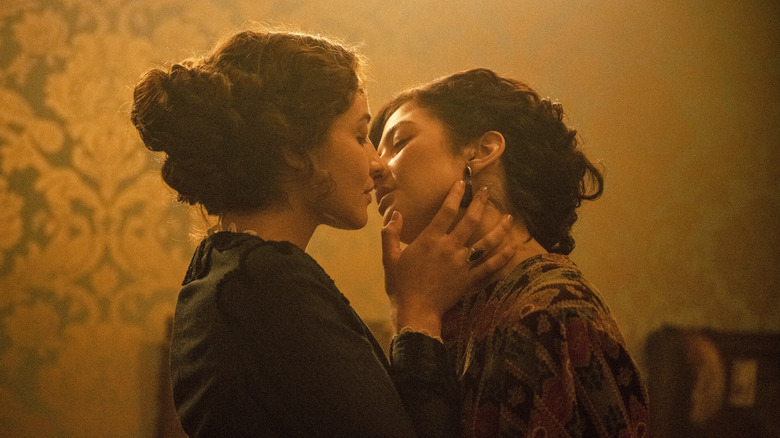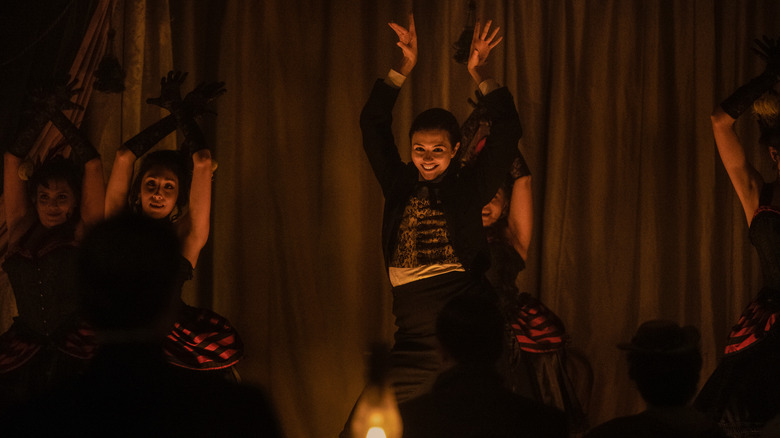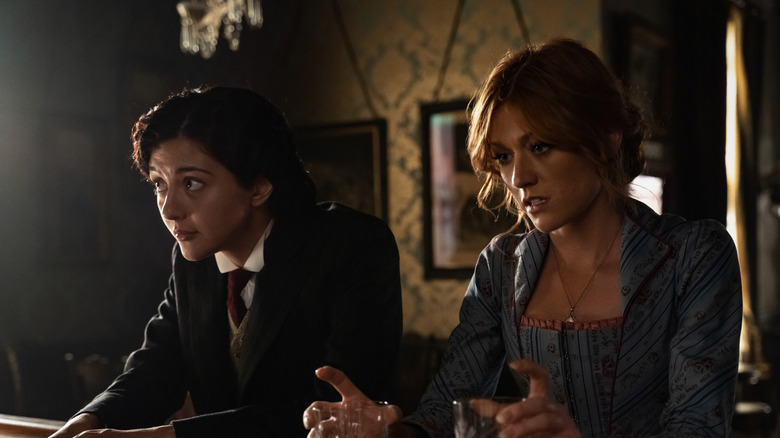Katie Findlay Says Their Walker Independence Character's LGBTQ+ Arc Is A Gift - Exclusive
One of "Walker" fans' biggest concerns when The CW announced the "Walker Independence" prequel was how the network would handle representation when so many Westerns have whitewashed and straightwashed history. However, "Walker Independence" has some of the best diverse storylines of any Western we've ever seen. Between Justin Johnson Cortez's incredible Native storyline to Katie Findlay's on-screen exploration of gender and sexuality, the series is far more than a tale of cowboys finding their way in Texas.
The women are more than set dressing, all the characters have rich backstories, and the queer characters are shown through a joyful lens. Even better? The creatives behind the scenes gave the actors a voice, encouraging them to lead conversations about how to approach certain subjects — adding vital authenticity to the characters. Looper spoke to Katie Findlay during an exclusive interview, where they discussed the joys of tackling Kate's LGBTQ+ arc on "Walker Independence."
Queer representation is a gift
Katie Findlay reflected on the highlights of exploring gender and sexuality in the 1800s through Kate: "Part of the beautiful thing that I've experienced on this show is connecting queerness, Blackness, Indigenous history, Chinese history, Latinx Mexican history, and quite frankly, sex worker history, working-class history." The series wanted to add that level of authenticity, as Findlay explained. "All of these people knew and supported each other the entire time ... We often lose that narrative-wise in history for pointed reasons."
Through the series, Findlay has learned a lot about their own identity and how LGBTQ+ individuals expressed themselves back in the Wild West. "I had no idea the extent of it until I got to sit in this show for a little while, and every moment of Kate's queerness is a gift to me. She was queer to start with," Findlay noted. "It wasn't just because of me ... When I started asking for it, I was told, 'This is what we were thinking for her anyway. But if you would like this person to be queer in the way that maybe you are queer, let's go for it.'"
The creators letting actors weigh in on their characters was the right move both for adding realism to the characters and giving the actors more to work with. "[That] is a joyful and integral choice that I appreciate very much," Findlay noted.
Setting the record straight on Western history
The show even helped Katie Findlay work out some of their own queerness. "I'm someone who moved into certain parts of my queerness that I wasn't familiar with in my thirties. As I was figuring this out, this show came along," they explained. "I remember sitting down with Seamus Fahey ... and asking if that was a viable thing to pour into the vessel of someone a little bit anachronistic for the time period. He and the rest of production have been so loving and generous with me on that front."
And though people like to rewrite history and pretend that the LGBTQ+ community didn't exist "back in the day," Findlay wants to squash that misunderstanding. They added, "Non-gender-conforming presentation was very, very common in the 1800s, and the panic about cross-dressing and gender moving into deviant sexuality ... My understanding is that it didn't really get malicious or stringent until near the end of the century."
In some ways, there was even more understanding of cross-dressing in the 1800s West. "If you were, like Kate, a femme person who presented as masculine sometimes or went back and forth, people would go, 'Oh, it's the arts. They do this in Europe,'" Findlay explained. "It's so much safer to travel as a woman if you're dressed like a man ... She's obviously a beautiful dashing heroine in disguise as the roughneck."
The season finale of "Walker Independence" airs on March 2. The episode will stream for free on The CW website and app the next day.


